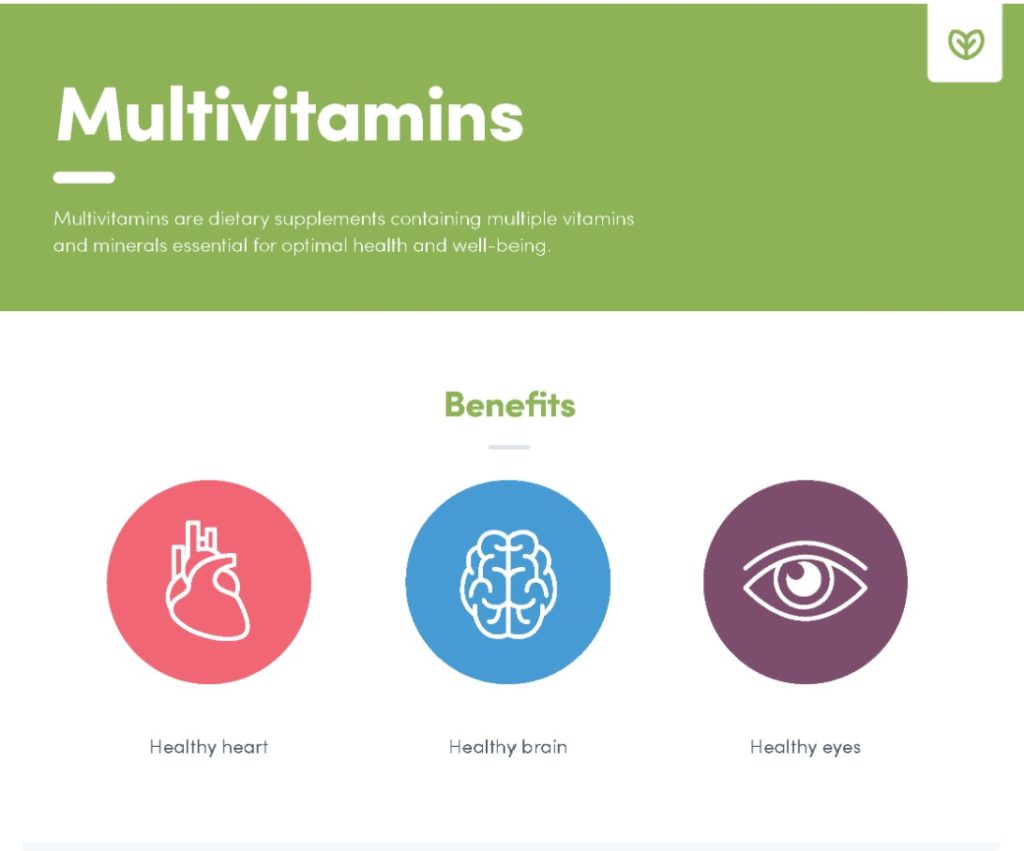You’ve likely heard that multivitamins can help prevent nutrient deficiencies and ensure that you’re getting adequate amounts of essential vitamins and minerals. Research indicates that daily supplementation of multivitamins may also support your health in numerous ways, including reducing your risk of cardiovascular disease and promoting healthy cognitive function. (1,2,3)

Multivitamins contain multiple vitamins and minerals essential for good health. (1)(4)(5)(3)
May improve cardiovascular health
While results vary, some studies have proposed a possible connection between multivitamin supplementation and a reduced risk of developing cardiovascular disease. Two studies with large population sizes showed that although short-term multivitamin use has no significant effect on heart health, consistent long-term use (>3 to ≥20 years) significantly decreases the risk of heart attack or cardiovascular disease-related death in both men and women. (1)(3)
Boost cognitive function and mood
Taking a daily multivitamin may improve memory, particularly among older adults at risk of cognitive decline. A study of older women complaining of memory issues found that daily multivitamin supplementation for 16 weeks significantly improved short-term memory compared to the group receiving a placebo. (1) A double-blind study of 51 sedentary men between the ages of 50 and 74 also found that short-term (eight weeks) multivitamin supplementation significantly improved episodic memory, which is the ability to recall previous experiences, compared to the group receiving a placebo. (6)
Additional research suggests that multivitamins may improve mood. A study of 138 healthy adults between the ages of 20 and 50 showed a significant reduction in perceived stress levels, physical fatigue, and anxiety following 16 weeks of multivitamin use. (7) Multivitamins containing larger doses of B vitamins have proven to be the most effective in improving mood. It’s believed that because dietary inadequacies and nutrient deficiencies may negatively affect mood, supplementing with a multivitamin may be responsible for these benefits. (8)(7)
Protect eyes from age-related damage
Multivitamins may help slow the progression of age-related macular degeneration, the leading cause of vision loss in adults over the age of 50. (9)(10) This benefit is believed to be attributed in part to the antioxidants found in multivitamins, including vitamin C, vitamin E, and zinc, which protect the eye macula from degeneration and the retinas from cellular damage. (10)
A randomized, double-blind study of 14,641 male physicians over 50 years old discovered that long-term (> 11 years) multivitamin use reduced the risk of developing eye cataracts (cloudy eye lenses). (11)
Correct nutrient deficiencies in certain gastrointestinal conditions
Multivitamin supplements have demonstrated effectiveness in improving nutrient deficiencies in individuals with gastrointestinal conditions that cause malabsorption, such as celiac disease and inflammatory bowel disease (IBD). Supplementing with specific vitamins and minerals found in multivitamins, including vitamin D, vitamin B12, folic acid, iron, and zinc, may reverse nutrient deficiencies and improve disease symptoms in some cases. (12)(13)
Our next blog will get into the nitty-gritty of choosing an optimal Multivitamin.
Portions of this blog is sourced with permission from Fullscript.com.
1. Bailey, R. L., Fakhouri, T. H., Park, Y., Dwyer, J. T., Thomas, P. R., Gahche, J. J., … Murray, D. M. (2015). Multivitamin-mineral use is associated with reduced risk of cardiovascular disease mortality among women in the United States. The Journal of Nutrition, 145(3), 572–578.
2. Macpherson, H., Silberstein, R., & Pipingas, A. (2012). Neurocognitive effects of multivitamin supplementation on the steady state visually evoked potential (SSVEP) measure of brain activity in elderly women. Physiology & Behavior, 107(3), 346–354.
3. Rautiainen, S., Rist, P. M., Glynn, R. J., Buring, J. E., Gaziano, J. M., & Sesso, H. D. (2016). Multivitamin use and the risk of cardiovascular disease in men. The Journal of Nutrition, 146(6), 1235–1240.
4. National Institutes of Health. (2019, October 17). Multivitamin/mineral supplements. Retrieved from https://ods.od.nih.gov/factsheets/MVMS-HealthProfessional/
5. National Institutes of Health. (2020, August 11). Using dietary supplements wisely. Retrieved from https://www.nccih.nih.gov/health/using-dietary-supplements-wisely
6. Harris, E., Macpherson, H., Vitetta, L., Kirk, J., Sali, A., & Pipingas, A. (2012). Effects of a multivitamin, mineral and herbal supplement on cognition and blood biomarkers in older men: a randomised, placebo-controlled trial. Human Psychopharmacology: Clinical and Experimental, 27(4), 370–377.
7. Pipingas, A., Camfield, D. A., Stough, C., Cox, K. H. M., Fogg, E., Tiplady, B., … Scholey, A. B. (2013). The effects of multivitamin supplementation on mood and general well-being in healthy young adults. A laboratory and at-home mobile phone assessment. Appetite, 69, 123–136.
8. Long, S.-J., & Benton, D. (2013). Effects of vitamin and mineral supplementation on stress, mild psychiatric symptoms, and mood in nonclinical samples. Psychosomatic Medicine, 75(2), 144–153.
9. American Optometric Association. (n.d.). Age-related macular degeneration. Retrieved August 11, 2020, from https://www.aoa.org/patients-and-public/eye-and-vision-problems/glossary-of-eye-and-vision-conditions/macular-degeneration
10. Evans, J. R., & Lawrenson, J. G. (2017). Antioxidant vitamin and mineral supplements for slowing the progression of age-related macular degeneration. Cochrane Database of Systematic Reviews, 7(7), 1.
11. Christen, W. G., Glynn, R. J., Manson, J. E., MacFadyen, J., Bubes, V., Schvartz, M., … Gaziano, J. M. (2014). Effects of multivitamin supplement on cataract and age-related macular degeneration in a randomized trial of male physicians. Ophthalmology, 121(2), 525–534.
12. Rondanelli, M., Faliva, M. A., Gasparri, C., Peroni, G., Naso, M., Picciotto, G., … Perna, S. (2019). Micronutrients dietary supplementation advices for celiac patients on long-term gluten-free diet with good compliance: A review. Medicina, 55(7), 337.
13. Rossi, R. E., Whyand, T., Murray, C. D., Hamilton, M. I., Conte, D., & Caplin, M. E. (2016). The role of dietary supplements in inflammatory bowel disease. European Journal of Gastroenterology & Hepatology, 28(12), 1357–1364.
